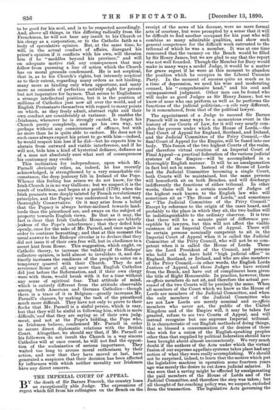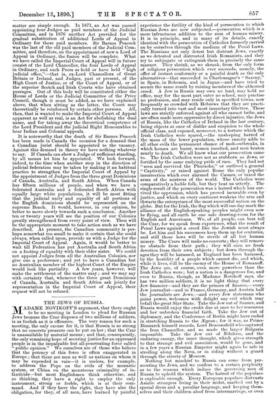THE IMPERIAL COURT OF APPEAL.
BY the death of Sir Barnes Peacock, the country loses 13 an exceptionally. able Judge. The expressions of regret which fell from his colleagues on the Bench on the receipt of the news of his decease, were no mere formal acts of courtesy, but were prompted by a sense that it will be difficult to find another occupant for his post who will combine so many admirable qualities, and show such general competence for the difficult work entrusted to the tribunal of which he was a member. It was at one time rumoured that the vacancy on the Bench would be filled by Sir Henry James, but we are glad to say that the report was not well founded. Though the Member for Bury would make in many ways a model Judge, it would be a matter for grave regret if he were at this moment to abandon the position which he occupies in the Liberal Unionist Party. In the moment of success quite as much as in a time of depression, we need his wise and moderating counsel, his " comprehensive head," and his cool and unimpassioned judgment. Other men can be found who will make as good Judges as Sir Henry James ; but we know of none who can perform as well as he performs the functions of the judicial politician,—a role very different, be it remembered, from that of the political lawyer.
The appointment of a Judge to succeed Sir Barnes Peacock will in many ways be a momentous event in the history of our Courts of Law, for it will very nearly com- plete the process under which the House of Lords,—the final Court of Appeal for England, Scotland, and Ireland, and the Judicial Committee of the Privy Council,—the final Court of Appeal for the Empire, will be fused into one body. This fusion of the two highest Courts of the realm, and therefore virtual creation of an Imperial Court of Final Appeal—a practical federation of the various judicial systems of the Empire—will be accomplished in a thoroughly English manner. It will be an amalgamation in fact but not in name. Instead of the House of Lords and the Judicial Committee becoming a single Court, both Courts will be maintained, but the same persons will henceforth sit on both Benches, and will discharge indifferently the functions of either tribunal. In other words, there will be a certain number of Judges of the highest rank known to the English law who will sometimes sit as " The House of Lords," and sometimes as " The Judicial Committee of the Privy Council." Except by reference to the origin of the cases heard, and probably to the place in which they sit, the two bodies will be indistinguishable to the ordinary observer. It is true that there will be a minute point of difference per- ceptible by lawyers, but this will not affect the -visible existence of an Imperial Court of Appeal. There will be certain persons nominally competent to sit in the Imperial Court of Appeal when it is called the Judicial Committee of the Privy Council, who will not be so com- petent when it is called the House of Lords. These are the Lord President of the Council, and persons who hold or who have held " high judicial office " in England, Scotland, or Ireland, and who are also members of the Privy Council,—in other words, the English Lords Justices of Appeal, and those Judges who have retired from the Bench, and have out of compliment been given the title of Right Honourable. In practice, however, these ex-officio members do not sit, and therefore the actual per- sonnel of the two Courts will be precisely the same. When all members of the Court which we know as the House of Lords are members of the Judicial Committee, and when the only members of the Judicial Committee who are not Law Lords are merely nominal and ex-officio members who never act, the public of the United Kingdom and of the Empire will, it may be taken for granted, refuse to see two Courts of Appeal, and will instead recognise but one supreme Imperial tribunal. It is characteristic of our English methods of doing things, that so blessed a consummation of the desires of those who wish for a union of the English-speaking peoples other than that supplied by political federation should have been brought about almost unconsciously. We very much doubt if the authors of the Acts under which the virtual fusion of our supreme appellate systems takes place had any notion of what they were really accomplishing. We should not be surprised, indeed, to learn that the motive which put the legislative machine in operation some fourteen years ago was merely the desire to cut down judicial salaries. It was seen that a saving might be effected by amalgamating the paid members of the House of Lords and of the Judicial Committee, and therefore the step was taken ; but all thought of far-reaching policy was, we suspect, excluded from the transaction. The legislative Acts governing the matter are simple enough. In 1871, an Act was passed appointing four Judges as paid members of the Judicial Committee, and in 1876 another Act provided for the gradual substitution of additional Lords of Appeal in Ordinary for these paid members. Sir Barnes Peacock was the last of the old paid members of the Judicial Com- mittee, and therefore, on the appointment of new a Lord of Appeal in Ordinary, the fusion will be complete. What we have called the Imperial Court of Appeal will in future consist of the Lord Chancellor, the four Lords of Appeal in Ordinary, and such Peers as hold or have held " high judicial office,"—that is, ex-Lord Chancellors of Great Britain or Ireland, and Judges, past or present, of the High Court of Justice, or of the Court of Appeal, or of the superior Scotch and Irish Courts who have obtained peerages. Out of this body will be constituted either the House of Lords or the Judicial Committee of the Privy Council, though it must be added, as we have explained above, that when sitting as the latter, the Court may theoretically be reinforced by certain other persons. All, then, that is wanted to make the Imperial Court of Appeal apparent as well as real, is an Act for abolishing the dual name, and for taking away the theoretical competence of the Lord President and the judicial Right Honourables to hear Indian and Colonial appeals.
It is noteworthy that the death of Sir Barnes Peacock has been made in Canada the occasion for a demand that a Canadian jurist should be appointed to the vacancy. Against this demand in theory we have nothing whatever to say. If Canada can show a Judge of sufficient standing, by all means let him be appointed. We look forward, indeed, to the time when another step in the direction of judicial federation may be taken by making it an habitual practice to strengthen the Imperial Court of Appeal by the appointment of Judges from the three great Dominions of Canada, Australia, and South Africa. When Canada has fifteen millions of people, and when we have a federated Australia and a federated South Africa with equally large white populations, it will be most fitting that the judicial unity and equality of all portions of the English dominions should be represented on the supreme Bench. It would, however, in our opinion, be better to move slowly towards such a conclusion. Another ten or twenty years will see the position of our Colonies greatly strengthened from every point of view. Then will be the appropriate moment to take action such as we have described. At present, the Canadian community is per- haps somewhat too small to make it certain that she could always, when called upon, provide us with a Judge for the Imperial Court of Appeal. Again, it would be better to wait till Federation has put Australia and South Africa on a footing of equality with their elder sister. We could not appoint Judges from all the Australian Colonies, nor give one a preference ; and yet to have a Canadian but no Australian member of the highest Court of the Empire would look like partiality. A few years, however, will make the settlement of the matter easy ; and we may say with certainty that, whenever the three great Dominions of Canada, Australia and South Africa ask jointly for representation in the Imperial Court of Appeal, their request will not be refused.











































 Previous page
Previous page